

27 Scientifically Proven Benefits of Counseling. Anyone who has had the opportunity to work with a skilled counselor can likely state the personal benefits of the experience.
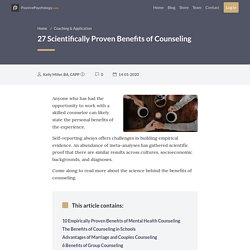
Self-reporting always offers challenges in building empirical evidence. An abundance of meta-analyses has gathered scientific proof that there are similar results across cultures, socioeconomic backgrounds, and diagnoses. Come along to read more about the science behind the benefits of counseling. 10 Empirically Proven Benefits of Mental Health Counseling Being mentally healthy has many benefits. Historically, the misinterpretation of Freudian speculation has tainted the modern understanding of the benefits of psychotherapy (Shedler, 2010).
The following seven features were reliably noted as efficacious: A focus on affect and expression of emotions. Knowing that about 18% of the population has presented with some form of mental disorder or disruption (Harvey, 2015) is a call to action. When evaluating intervention outcomes, a level of specificity must be considered. 5 Things Therapists Wish Everyone Knew About Mental Health. Source: Adobe Stock Most people who walk into my therapy office tell me that they had thought about getting help for years.
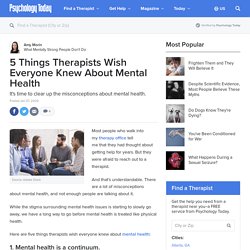
But they were afraid to reach out to a therapist. And that’s understandable. The Benefits of Mental Health According to Science. The absence of mental illness does not equal mental health.
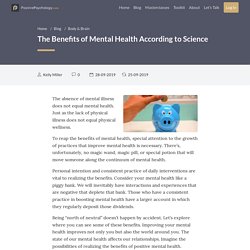
Just as the lack of physical illness does not equal physical wellness. What are Mental Health Theories? (Incl. List) Have you ever met with a counselor or therapist and thought, “This is not a good fit?”
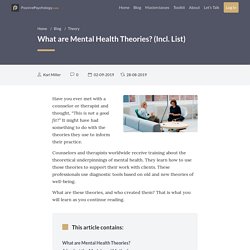
It might have had something to do with the theories they use to inform their practice. Counselors and therapists worldwide receive training about the theoretical underpinnings of mental health. They learn how to use those theories to support their work with clients. These professionals use diagnostic tools based on old and new theories of well-being. What are these theories, and who created them? What is the Mental Health Continuum Model? Think about it.
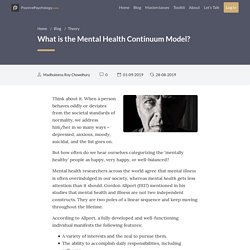
When a person behaves oddly or deviates from the societal standards of normality, we address him/her in so many ways – depressed, anxious, moody, suicidal, and the list goes on. But how often do we hear ourselves categorizing the ‘mentally healthy’ people as happy, very happy, or well-balanced? Mental health researchers across the world agree that mental illness is often overindulged in our society, whereas mental health gets less attention than it should. Gordon Allport (1937) mentioned in his studies that mental health and illness are not two independent constructs. They are two poles of a linear sequence and keep moving throughout the lifetime.
Mental Health Treatment Plans: Making Progress One Step at a Time. How Mental Health Conversations Are Reinforcing the Stigma. Source: AdobeStock If you've never experienced a bout of depression or anxiety, it might be easy to assume that it only happens to "some" people.
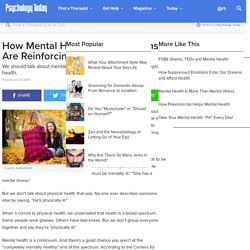
But here's the thing about mental illness: It doesn't discriminate. article continues after advertisement The phrase "mental illness" tends to be used in a derogatory manner. 10 Ways Animals Improve Mental Health. More and more, animals are becoming a part of people’s lives.
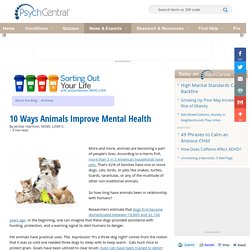
According to a Harris Poll, more than 3 in 5 American households have pets. That’s 62% of families have one or more dogs, cats, birds, or pets like snakes, turtles, lizards, tarantulas, or any of the multitude of other non-traditional animals. So how long have animals been in relationship with humans? Researchers estimate that dogs first became domesticated between 18,800 and 32,100 years ago. In the beginning, one can imagine that these dogs provided assistance with hunting, protection, and a warning signal to alert humans to danger. Pet animals have practical uses. But, domesticated animals or pets provide more than practical help, as any pet owner will tell you. Here are ten ways that pets improve mental health. The act of stroking an animal has a calming effect and reduces anxiety. Even if you don’t own an animal, you can reap the benefits of one by visiting a shelter to walk the dogs or hold the cats. Psychological Capital.
Emotional Abuse. Depression. Personal Financial Debt. Drug Addiction. Mental Health At Work.
Mental Health in Sport. Mental Health Screening Tools. - The Depression Test is for individuals who are feeling overwhelming sadness. - The Eating Disorder Test can help explore eating related concerns that have an impact on your physical health and overall well-being. - The Anxiety Test is for people who feel that worry and fear are affecting their ability to function day-to-day. - The Addiction Test (Alcohol and substance use test) will help determine if your use of alcohol or drugs is an area to address. - The Bipolar Test is for individuals who have mood swings - or unusual or extreme shifts in mood and energy. - The Youth Test is for young people (age 11-17) who are concerned that their emotions, attention, or behaviors might be signs of a problem. - The Parent Test is for parents of young people to determine if their child’s emotions, attention, or behaviors might be signs of a problem.
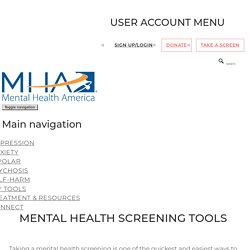
28 Mental Health Activities, Worksheets & Books for Adults & Students. Mental health is an important thing to talk about, but it can sometimes feel very uncomfortable.
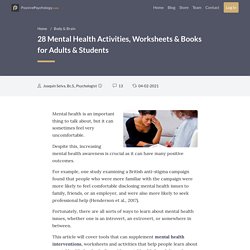
Despite this, increasing mental health awareness is crucial as it can have many positive outcomes. For example, one study examining a British anti-stigma campaign found that people who were more familiar with the campaign were more likely to feel comfortable disclosing mental health issues to family, friends, or an employer, and were also more likely to seek professional help (Henderson et al., 2017). 10 Best Mental Health Coaching Software Solutions. Times are changing, and fortunately for the better!
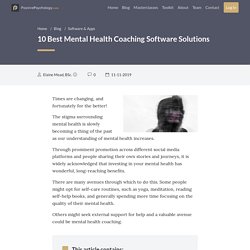
Health. VR Psychotherapy. Self-Conscious Emotions. Discrimination.